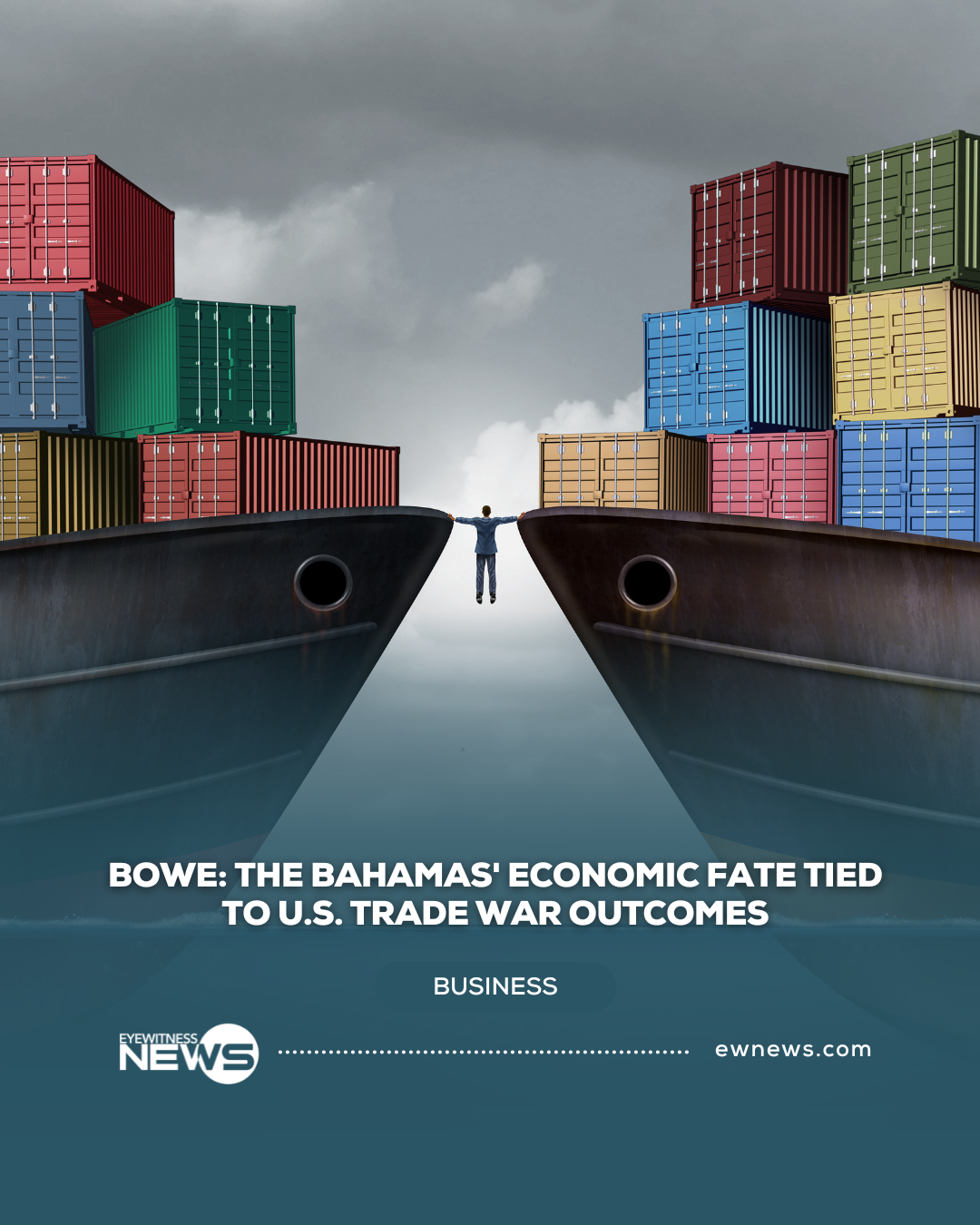NASSAU, BAHAMAS – Amidst the escalating global trade war, a well-known banker says that with The Bahamas being “tied at the hip” with the U.S. as its largest trading partner and major tourist source market, the country has little choice but to hope for a positive outcome for the United States, as its economic fate will be a major determinant of this country’s success.
Gowon Bowe, the CEO of Fidelity Bank (Bahamas), told Eyewitness News: “The United States is our largest trading partner and our largest source of GDP. Right now, we have no alternative strategy, whether we like it or not, but to be supportive of the actions of the United States because, win or lose, that’s going to determine how successful we are as a country.”
Bowe added: “While some may take the view that these actions are inconsistent with our moral compass, the reality is that when you are ‘tied at the hip,’ like we are, we sort of have to support them whether we agree or not. When I say support, that doesn’t mean vocalizing that it’s the ‘right’ action. What I’m saying is that there’s nothing we can do in the next 12 months that will change our heavy reliance on the United States. From that perspective, the best we can do is develop a national strategy that allows us to better diversify our reliance on the United States.”
The Bahamas will face a 10 percent tariff on all goods exported to the U.S. under sweeping new trade measures announced by U.S. President Donald Trump. The policy, which came into effect on April 5, imposes a baseline 10 percent tariff on imports from more than 100 countries, including several Caribbean nations. Trinidad and Tobago, Haiti, Jamaica, Barbados, and Antigua and Barbuda will all be subject to the same 10 percent rate when exporting to the U.S. Trump said the policy is meant to counter what he describes as unfair trade practices, claiming the U.S. has been disadvantaged for decades. While most countries will face the baseline tariff, others will see significantly higher rates. China’s total tariff burden will rise to 54 percent when combined with existing duties. The European Union will face a 20 percent tariff, while goods from Japan and India will be taxed at 24 percent and 26 percent, respectively.
“What is about to take place highlights for the country the lack of a national development plan. It is going to hurt us more in the coming months and possibly years than probably ever before in our history. The reason I say that is that the reality is the tariff actions by the United States and other countries, the trade war initiatives, are not ones that The Bahamas in any way can influence. And when I say in any way, I mean we really have no seat at the table. We have no bargaining chips and no influence whatsoever. So, the reality is that we, as a country, should have been preparing ourselves for what I’m going to call volatility and uncertainty, so that we’re able to best deal with it. If you look at the stock markets and recent activity, and you listen to value investors who have been around for a long time, what they would have recently said is that the investment horizon is what’s been hurting investors—those looking for short-term gains as opposed to long-term strategies,” said Bowe.
He added: “If you look at the stock market, even from the Great Depression in 1930 through to today, there’s always been, over the long term, an increase in the stock markets. The same is true for global trade and global GDP. The reality, though, is that you have brief periods of volatility, uncertainty, and contraction, whether that’s a stock market rebalancing, as they say, or corrections, whether that’s recessions or even great recessions like the one in 2008, or going back as far as 1930 with the Great Depression. The way you ride out all short-term volatility is by having long-term plans. By The Bahamas not having a clear tax reform strategy, where we are still based on consumption-based taxes, we’re really going to feel the effects of the tariff and trade wars—whether it be the tariffs imposed on imports into the United States, from which we buy most of our goods, which are going to have a knock-on effect on our costs, or the threat of fees on non-U.S. or specifically China-built vessels. All of these are things that will bring inflationary pressures to The Bahamas. And by us still being in a consumption tax-based system, it will be those on the lower margins who will bear the brunt.”
Bowe noted that the impact of the government’s recent action to reduce VAT on food may be short-lived, if at all, because it will ultimately be affected by the price increases resulting from purchasing goods from the United States.
“The talk about diversifying trade partners and identifying new trade routes, etc., if we had a long-term plan, strategy, and vision, these would have been things that we would have worked on for a long time. A lot of Bahamians don’t know that there was significant trade with Haiti 50 to 60 years ago in terms of various goods. If we look at tourism, we are bracing ourselves for its impact, but again, have we developed a vision for tourism that defines what the high-end market is? The reality is, persons who fly in private jets, yachts, etc., won’t be as impacted by the trade war, and if we had specific strategies for those types of travelers, that market would remain largely unimpacted.”
Central Bank Governor John Rolle recently cautioned that the global economic slowdown, driven by new tariffs, will likely affect The Bahamas, urging close monitoring of its impact on the nation’s economic performance.
Speaking “on the sidelines” of a recent financial fair at the Baha Mar resort, Governor Rolle said: “The overall expectation is that the tariffs will slow down global economic activity. As the world adjusts and transitions, The Bahamas will also feel the impact. We will need to monitor these developments closely to assess the exact level of effect on The Bahamas.”
He added: “When we released our most recent economic analysis, we indicated that there were upside risks to inflation due to the impact of the tariffs. We also noted that, given the influence of economic developments on consumer behavior and sentiment, we expect some slowdown in the momentum we experienced in areas like tourism performance.”


















